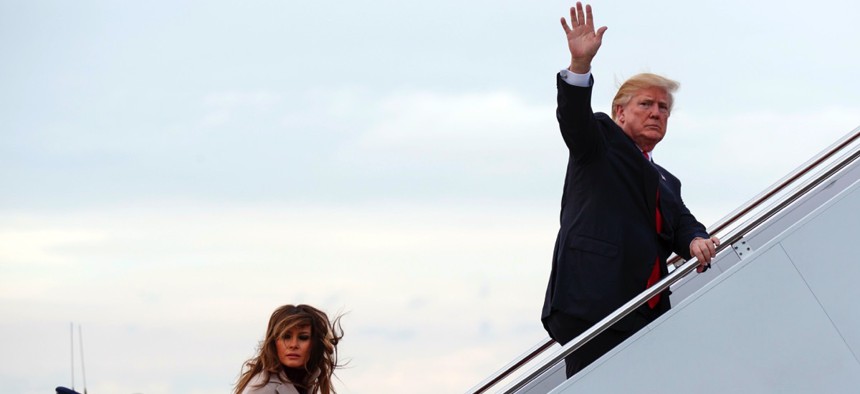Blaming States, Trump Dissolves Election Integrity Commission

President Trump and first lady Melania Trump board Air Force One at Palm Beach International Airport on Jan. 1 in West Palm Beach, Fla. Evan Vucci / AP Photo

Connecting state and local government leaders
The body struggled to compile concrete evidence of widespread voter fraud, wracking up lawsuits over voter suppression in the process.
President Trump dissolved his Advisory Commission on Election Integrity on Wednesday evening via an executive order, blaming noncompliant states’ refusal to provide sensitive voter file data for the effort’s failure.
Trump established the controversial commission by executive order, which has since been removed from the White House website, after suggesting without any hard evidence that voter fraud by non-citizens was to blame for his second-place finish behind Democrat Hillary Clinton in the popular vote during the 2016 presidential election.
The commission’s formation immediately drew criticism from groups like the American Civil Liberties Union for being comprised primarily of Republicans previously accused of voter suppression like its vice chair, Kansas Secretary of State Kris Kobach. The ACLU was one of several groups to sue the commission over its refusal to allow in-person attendance of meetings and failure to make all of its records public, in accordance with the Federal Advisory Committee Act.
More recently, the commission came under fire from the Obama administration’s director of national intelligence, Jim Clapper, and other national security and cybersecurity experts over its plan to create a U.S. voter database that could become the target of hackers. Clapper and the other experts signed onto an amicus brief filed in federal court in support of nonprofit Common Cause’s lawsuit against the commission.
Trump’s full statement read:
“Despite substantial evidence of voter fraud, many states have refused to provide the Presidential Advisory Commission on Election Integrity with basic information relevant to its inquiry. Rather than engage in endless legal battles at taxpayer expense, today I signed an executive order to dissolve the Commission, and have asked the Department of Homeland Security to review these issues and determine next courses of action.”
Also on Wednesday, a federal judge set a trial date of March 6 for the ACLU’s challenge to voting obstacles Kobach is accused of setting in Kansas. The ACLU said it’s representing more than 17,000 people illegally forced to provide additional documentation of U.S. citizenship at the state’s Division of Vehicles, in violation of the National Voter Registration Act.
The judge’s ruling also prohibited Hans von Spakovsky, a commission member, from testifying as to whether Kobach’s new voting restrictions placed a burden on voters stating: “It is clear that von Spakovsky is not qualified to testify as an expert …”
“Kris Kobach has repeatedly tried to disenfranchise Kansans, and the courts have repeatedly blocked his attempts,” Dale Ho, the ACLU’s Voting Rights Project director, said in a statement. “We look forward to showing yet again how Kobach’s actions undermine voters and are illegal.”
Dave Nyczepir is a News Editor at Government Executive’s Route Fifty and is based in Washington, D.C.

NEXT STORY: The mobile mandate: Congress requires mobile friendly websites





